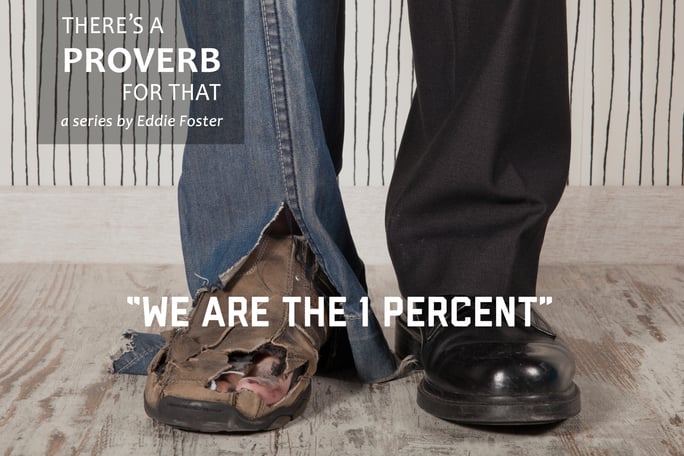There’s a Proverb for That: “We Are the 1 Percent”
What wisdom does the ancient book of Proverbs provide regarding those who are wealthy—the so-called 1 percent? What specific warnings does it give them?

Because our last post focused on the middle and lower income earners, this post will focus on what Proverbs says about the wealthy.
Class warfare: a cauldron of stereotypes and generalizations
Those who criticize the wealthy 1 percent seem to only focus on the businesses caught cheating or lying, immoral entertainers who live extravagant lifestyles and the CEOs who make around 300 times more than their employees. Of course, all these kinds exist, but they are extremes and do not represent the vast majority of wealthy people. There are many 1 percenters who give large portions of their personal income to charity or provide thousands of jobs to 99 percenters that pay a living wage with benefits.
Since there is no partiality with God (Romans 2:11), Christians should not have prejudiced, negative opinions about either the wealthy or the “not-so-wealthy.”
Thankfully, there’s a Proverb for that!
Proverbs and implications
1. Proverbs 22:2: “The rich and the poor have this in common, the LORD is the maker of them all.”
Whether we have $10 or $10 million, we are human beings created in the image of God who have the choice to do the right or the wrong thing. Both the 1 percent and the 99 percent are imperfect people with various character flaws. For example, both the rich and the non-rich can be greedy and selfish with their resources.
Christians should not have prejudiced, negative opinions about either the wealthy or the “not-so-wealthy.”
Implications: Remember that we are all human. We will all make mistakes, commit sins and suffer the consequences. Looking at the 1 percent as greedy monsters and the 99 percent as lazy whiners is wrong and makes us the problem.
2. Proverbs 14:20: “The poor man is hated even by his own neighbor, but the rich has many friends.”
This frank statement is dealing with the concept of privilege. It seems to be a universal truth that those with more wealth have more opportunities and “friends in high places” than those with less money. Simply put, there are perks that come from having wealth.
Implications: Statements such as “privilege doesn’t exist” and “everyone has the same opportunity” are denials of Scripture. Many things in life are easier when you have many friends (often in “high places”) and aren’t a total slave to the lender (Proverbs 22:7). The wealthier should humbly acknowledge that privilege does exist and show understanding and fairness toward those who are not as privileged.
3. Proverbs 28:6: “Better is the poor who walks in his integrity than one perverse in his ways, though he be rich.”
The book of Proverbs is filled with admonitions to be honest and generous. Several proverbs warn against dishonest and corrupt business practices (Proverbs 20:10, 23), and God tells us generosity to the poor is like lending to Him (Proverbs 19:17).
Implications: Capitalism without a conscience is like anything else without a conscience: ungodly. God expects the 1 percent to be kind, generous, honest and every other quality He expects out of the 99 percent. It is a reality that having great wealth can make some of these characteristics harder. Jesus Christ used a graphic example to show how hard it can be for a rich man to enter the Kingdom of God (Matthew 19:23-26). Hard, yes. But impossible? With God, no.
Need more proverbs? You got it
Considering the many proverbs dealing with the subject of the haves and have nots, here’s the overall gist of the matter for the 1 percent: Great wealth does not make one evil, but the wealthiest among us do have a great responsibility to reject greed and self-righteousness and to exemplify honesty and generosity in their character.
When lots of money starts to equal glory and power in our minds, remember, there’s a proverb for that.
To learn more about the spiritual dangers of wealth, read about “Laodicea.”
Read the next blog post in this series: There’s a Proverb for That: “I’m Addicted. Help Me!”
Date Posted: January 24, 2017

 by Eddie Foster
by Eddie Foster

